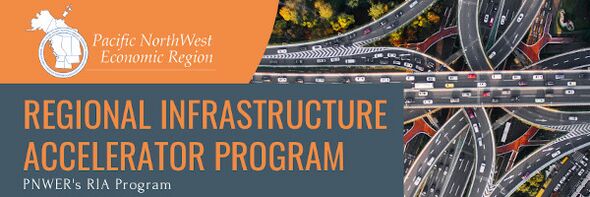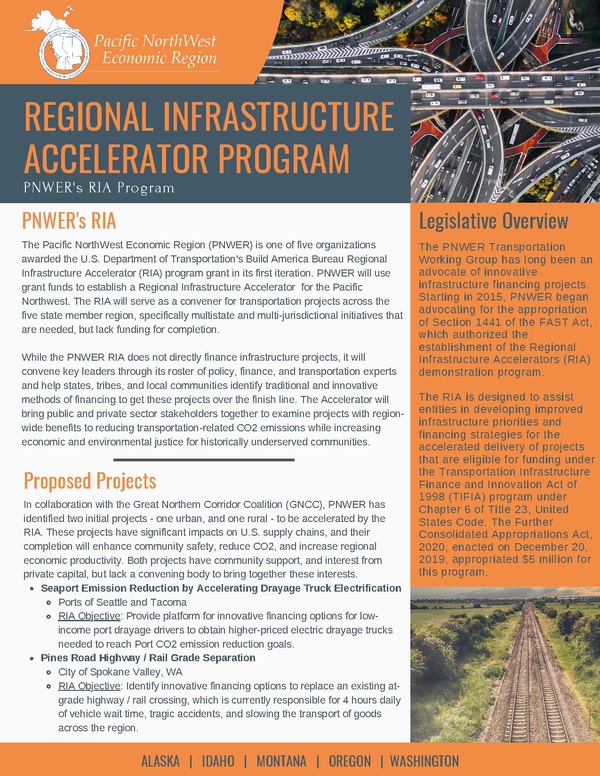Regional Infrastructure Accelerator Program: Difference between revisions
No edit summary |
No edit summary |
||
| (2 intermediate revisions by the same user not shown) | |||
| Line 6: | Line 6: | ||
|location_city=Portland OR | |location_city=Portland OR | ||
|status=Launched | |status=Launched | ||
|sector=Smart Region | |sector=Smart Region | ||
|chapter=Intelligent Transportation | |||
|summary=The Pacific NorthWest Economic Region (PNWER) is one of five organizations awarded the U.S. Department of Transportation's Build America Bureau Regional Infrastructure Accelerator (RIA) program grant in its first iteration. PNWER will use grant funds to establish a Regional Infrastructure Accelerator for the Pacific Northwest. The RIA will serve as a convener for transportation projects across the five state member region, specifically multistate and multi-jurisdictional initiatives that are needed, but lack funding for completion. | |summary=The Pacific NorthWest Economic Region (PNWER) is one of five organizations awarded the U.S. Department of Transportation's Build America Bureau Regional Infrastructure Accelerator (RIA) program grant in its first iteration. PNWER will use grant funds to establish a Regional Infrastructure Accelerator for the Pacific Northwest. The RIA will serve as a convener for transportation projects across the five state member region, specifically multistate and multi-jurisdictional initiatives that are needed, but lack funding for completion. | ||
|updated=2022-04-05 | |||
}} | }} | ||
With this regional perspective, the PNWER RIA is well-positioned to advocate andassist infrastructure projects that have significant region-wide impacts. By workingclosely with state departments of transportation, and organizations like the GreatNorthern Corridor Coalition (GNCC), the PNWER RIA can | With this regional perspective, the PNWER RIA is well-positioned to advocate andassist infrastructure projects that have significant region-wide impacts. By workingclosely with state departments of transportation, and organizations like the GreatNorthern Corridor Coalition (GNCC), the PNWER RIA can | ||
convene multi-statestakeholders in the public and private sectors to coordinate in updating the region'sinfrastructure to ensure safety, reduce greenhouse gas emissions, all whileimproving livability and economic growth well into the 21st century. | convene multi-statestakeholders in the public and private sectors to coordinate in updating the region'sinfrastructure to ensure safety, reduce greenhouse gas emissions, all whileimproving livability and economic growth well into the 21st century. | ||
[[ | [[File:Regional Infrastructure Accelerator (RIA) Program Flyer.pdf|600px|center|Regional Infrastructure Accelerator (RIA) Program Flyer]] | ||
Latest revision as of 05:06, January 25, 2023
| Regional Infrastructure Accelerator Program | |
 Regional Infrastructure Accelerator Program | |
| Team Organizations | Alaska Idaho Montana Oregon Washington GreatNorthern Corridor Coalition (GNCC) |
| Point of Contact | Betz Mayer |
| Participating Municipalities | Portland OR |
| Sectors | Smart Region |
| Initiative | |
| Status | Launched |
| Last Updated | January 31, 2026 |
Summary
The Pacific NorthWest Economic Region (PNWER) is one of five organizations awarded the U.S. Department of Transportation's Build America Bureau Regional Infrastructure Accelerator (RIA) program grant in its first iteration. PNWER will use grant funds to establish a Regional Infrastructure Accelerator for the Pacific Northwest. The RIA will serve as a convener for transportation projects across the five state member region, specifically multistate and multi-jurisdictional initiatives that are needed, but lack funding for completion.
With this regional perspective, the PNWER RIA is well-positioned to advocate andassist infrastructure projects that have significant region-wide impacts. By workingclosely with state departments of transportation, and organizations like the GreatNorthern Corridor Coalition (GNCC), the PNWER RIA can convene multi-statestakeholders in the public and private sectors to coordinate in updating the region'sinfrastructure to ensure safety, reduce greenhouse gas emissions, all whileimproving livability and economic growth well into the 21st century.
